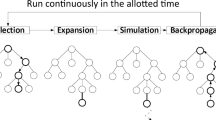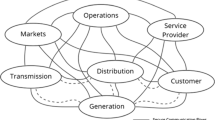Abstract
One of the main objectives of a peer-to-peer energy market is to efficiently manage distributed energy resources while creating additional financial benefits for the participants. Cooperative game theory offers such a framework, and the Shapley value, a cooperative game payoff allocation based on the participants’ marginal contributions made to the local energy coalition, is shown to be fair and efficient. However, its high computational complexity limits the size of the game. In order to improve this peer-to-peer cooperative scheme’s scalability, this paper investigates and adapts a stratified sampling method for the Shapley value estimation. It then proposes a multi-step sampling strategy to further reduce the computation time by dividing the samples into incremental parts and terminating the sampling process once a certain level of estimation performance is achieved. Finally, selected case studies demonstrate the effectiveness of the proposed method, which is able to scale up the game from 20 players to 100 players.
Similar content being viewed by others
References
J. Skea, D. Anderson, T. Green, R. Gross, P. Heptonstall, and M. Leach, “Intermittent renewable generation and the cost of maintaining power system reliability,” IET Gener. Transm. Distrib., vol. 1, no. 2, p. 324, 2007.
H. K. Jacobsen and S. T. Schroder, “Curtailment of renewable generation: Economic optimality and incentives,” Energy Policy, vol. 49, pp. 663–675, 2012.
K. Worthmann, C. M. Kellett, P. Braun, L. Grüne, and S. R. Weller, “Distributed and decentralized control of residential energy systems incorporating battery storage,” IEEE Trans. on Smart Grid, vol. 6, pp. 1914–1923, Jul. 2015.
D. F. Zhang, S. P. Zhang, Z. Q. Wang, and B. C. Lu, “Dynamic control allocation algorithm for a class of distributed control systems,” International Journal of Control, Automation and Systems, vol. 18, no. 2, pp. 259–270, 2020.
T. Morstyn, B. Hredzak, R. P. Aguilera, and V. G. Agelidis, “Model predictive control for distributed microgrid battery energy storage systems,” IEEE Trans. on Control Systems Technology, vol. 26, pp. 1107–1114, May 2018.
Y. Parag and B. K. Sovacool, “Electricity market design for the prosumer era,” Nature Energy, vol. 1, p. 16032, March 2016.
T. Sousa, T. Soares, P. Pinson, F. Moret, T. Baroche, and E. Sorin, “Peer-to-peer and community-based markets: A comprehensive review,” Renewable and Sustainable Energy Reviews, vol. 104, pp. 367–378, March 2019.
I. A. Sajjad, G. Chicco, and R. Napoli, “Definitions of demand flexibility for aggregate residential loads,” IEEE Trans. on Smart Grid, vol. 7, pp. 2633–2643, Nov 2016.
A. Pyrgou, A. Kylili, and P. A. Fokaides, “The future of the feed-in tariff (fit) scheme in europe: The case of photovoltaics,” Energy Policy, vol. 95, pp. 94–102, 2016.
N. Martin and J. Rice, “Solar feed-in tariffs: Examining fair and reasonable retail rates using cost avoidance estimates,” Energy Policy, vol. 112, pp. 19–28, 2018.
D. Kalathil, C. Wu, K. Poolla, and P. Varaiya, “The sharing economy for the electricity storage,” IEEE Trans. on Smart Grid, vol. 10, pp. 556–567, Jan 2019.
Y. Zhou, J. Wu, and C. Long, “Evaluation of peer-to-peer energy sharing mechanisms based on a multiagent simulation framework,” Applied Energy, vol. 222, pp. 993–1022, February 2018.
L. Jia and L. Tong, “Dynamic pricing and distributed energy management for demand response,” IEEE Trans. on Smart Grid, vol. 7, pp. 1128–1136, March 2016.
N. Liu, X. Yu, C. Wang, and J. Wang, “Energy sharing management for microgrids with pv prosumers: A stackelberg game approach,” IEEE Trans. on Industrial Informatics, vol. 13, pp. 1088–1098, June 2017.
B. Zhang, C. Jiang, J. L. Yu, and Z. Han, “A contract game for direct energy trading in smart grid,” IEEE Trans. on Smart Grid, vol. 9, pp. 2873–2884, July 2018.
J. Lee, J. Guo, J. K. Choi, and M. Zukerman, “Distributed energy trading in microgrids: A game-theoretic model and its equilibrium analysis,” IEEE Trans. on Industrial Electronics, vol. 62, pp. 3524–3533, June 2015.
Y. Zhang, S. Liang, and H. Ji, “Distributed Nash equilibrium seeking for aggregative games via derivative feedback,” International Journal of Control, Automation and Systems, vol. 18, no. 5, pp. 1075–1082, 2020.
J. L. Zhang, D. L. Qi, and M. Yu, “A game theoretic approach for the distributed control of multi-agent systems under directed and time-varying topology,” International Journal of Control, Automation and Systems, vol. 12, no. 4, pp. 749–758, 2014.
L. Han, T. Morstyn, and M. McCulloch, “Incentivizing prosumer coalitions with energy management using cooperative game theory,” IEEE Trans. on Power Systems, vol. 34, pp. 303–313, Jan 2019.
W. Lee, L. Xiang, R. Schober, and V. W. S. Wong, “Direct electricity trading in smart grid: A coalitional game analysis,” IEEE Journal on Selected Areas in Communications, vol. 32, no. 7, pp. 1398–1411, 2014.
P. Chakraborty, E. Baeyens, K. Poolla, P. P. Khargonekar, and P. Varaiya, “Sharing storage in a smart grid: A coalitional game approach,” IEEE Trans. on Smart Grid, vol. 10, pp. 4379–4390, July 2019.
C. Feng, F. Wen, S. You, Z. Li, F. Shahnia, and M. Shahidehpour, “Coalitional game-based transactive energy management in local energy communities,” IEEETrans. on Power Systems, vol. 35, pp. 1729–1740, May 2020.
L. Han, T. Morstyn, and M. McCulloch, “Constructing prosumer coalitions for energy cost savings using cooperative game theory,” Proc. of Power Systems Computation Conference (PSCC), pp. 1–7, June 2018.
L. S. Shapley, “Cores of convex games,” International Journal of Game Theory, vol. 1, no. 1, pp. 11–26, 1971.
A. C. Chapman, S. Mhanna, and G. Verbic, “Cooperative game theory for non-linear pricing of load-side distribution network support,” Proc. of The 3rd IJCAI Algorithmic Game Theory Workshop, 2017.
J. Castro, D. Gómez, and J. Tejada, “Polynomial calculation of the Shapley value based on sampling,” Computers and Operations Research, vol. 36, no. 5, pp. 1726–1730, 2009.
J. Castro, D. Gómez, E. Molina, and J. Tejada, “Improving polynomial estimation of the Shapley value by stratified random sampling with optimum allocation,” Computers and Operations Research, vol. 82, pp. 180–188, 2017.
J. P. Christophersen, C. D. Ho, C. G. Motloch, D. Howell, and H. L. Hess, “Effects of reference performance testing during aging using commercial lithium-ion cells,” Journal of The Electrochemical Society, vol. 153, no. 7, p. A1406, 2006.
J. Kim, H. Chun, M. Kim, J. Yu, K. Kim, T. Kim, and S. Han, “Data-driven state of health estimation of Li-Ion batteries with RPT-reduced experimental data,” IEEE Access, vol. 7, pp. 106987–106997, 2019.
R. Weber, “Probabilistic values for games,” Cowles Foundation Discussion Papers 471R, Cowles Foundation for Research in Economics, Yale University, 1977.
S. Han, S. Han, and H. Aki, “A practical battery wear model for electric vehicle charging applications,” Applied Energy, vol. 113, pp. 1100–1108, 2014.
C. Zhou, K. Qian, M. Allan, and W. Zhou, “Modeling of the cost of EV battery wear due to V2G application in power systems,” IEEE Trans. on Energy Conversion, vol. 26, pp. 1041–1050, July 2011.
Author information
Authors and Affiliations
Corresponding author
Additional information
Publisher’s Note Springer Nature remains neutral with regard to jurisdictional claims in published maps and institutional affiliations.
Recommended by Associate Editor Soohee Han under the direction of Editor-in-Chief Keum-Shik Hong.
This work was supported in part by the Engineering and Physical Sciences Research Council under Grants EP/N03466X/1, EP/S000887/1, and EP/S031901/1, and in part by the Oxford Martin Programme on Integrating Renewable Energy.
Liyang Han received his B.S degree in energy engineering from Zhejiang University, China, in 2012, and his M.S. degree in civil engineering from Stanford University, CA, USA, in 2014. He recently finished his Ph.D. defense at the University of Oxford and is expecting to confirm his Ph.D. degree by October 2020. He joined the Energy Analytics and Markets (ELMA) group at the Technical University of Denmark (DTU) in July 2020 as a postdoctoral researcher. His research interests include prosumer-centric energy markets and data markets.
Thomas Morstyn received his B.Eng. (Hon.) degree from the University of Melbourne, Australia, in 2011, and his Ph.D. degree from the University of New South Wales, Australia, in 2016, both in electrical engineering. He is a Lecturer in Power Electronics and Smart Grids with the School of Engineering at the University of Edinburgh, and he is also a visiting fellow with the Oxford Martin School at the University of Oxford. His research interests include multi-agent control and market design for integrating distributed energy resources into power system operations.
Malcolm McCulloch received his B.Sc. (Eng.) and Ph.D. degrees in electrical engineering from the University of the Witwatersrand, Johannesburg, South Africa, in 1986 and 1990, respectively. In 1993, he joined the University of Oxford, Oxford, U.K., to head up the Energy and Power Group, where he is currently an Associate Professor with the Department of Engineering Science. He is active in the areas of electrical machines, transport, and smart grids. His work addresses transforming existing power networks, designing new power networks for the developing world, developing new technology for electric vehicles, and developing approaches to integrated mobility.
Rights and permissions
About this article
Cite this article
Han, L., Morstyn, T. & McCulloch, M. Estimation of the Shapley Value of a Peer-to-peer Energy Sharing Game Using Multi-Step Coalitional Stratified Sampling. Int. J. Control Autom. Syst. 19, 1863–1872 (2021). https://doi.org/10.1007/s12555-019-0535-1
Received:
Revised:
Accepted:
Published:
Issue Date:
DOI: https://doi.org/10.1007/s12555-019-0535-1




